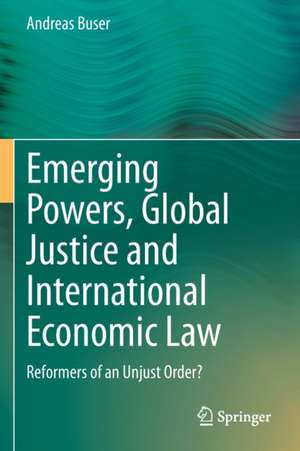Emerging Powers, Global Justice and International Economic Law: Reformers of an Unjust Order?
Autor Andreas Buseren Limba Engleză Paperback – 6 ian 2022
| Toate formatele și edițiile | Preț | Express |
|---|---|---|
| Paperback (1) | 897.14 lei 6-8 săpt. | |
| Springer International Publishing – 6 ian 2022 | 897.14 lei 6-8 săpt. | |
| Hardback (1) | 903.30 lei 6-8 săpt. | |
| Springer International Publishing – 5 ian 2021 | 903.30 lei 6-8 săpt. |
Preț: 897.14 lei
Preț vechi: 1094.08 lei
-18% Nou
Puncte Express: 1346
Preț estimativ în valută:
171.69€ • 186.43$ • 144.22£
171.69€ • 186.43$ • 144.22£
Carte tipărită la comandă
Livrare economică 23 aprilie-07 mai
Preluare comenzi: 021 569.72.76
Specificații
ISBN-13: 9783030636418
ISBN-10: 3030636410
Ilustrații: XXII, 423 p. 1 illus.
Dimensiuni: 155 x 235 mm
Greutate: 0.62 kg
Ediția:1st ed. 2021
Editura: Springer International Publishing
Colecția Springer
Locul publicării:Cham, Switzerland
ISBN-10: 3030636410
Ilustrații: XXII, 423 p. 1 illus.
Dimensiuni: 155 x 235 mm
Greutate: 0.62 kg
Ediția:1st ed. 2021
Editura: Springer International Publishing
Colecția Springer
Locul publicării:Cham, Switzerland
Cuprins
Introduction: The Crisis of International Law and the Role of Emerging Power.- Emerging Powers and the International Order - Outline of the Study.- Hegemony, Power, and International Law.- Global Justice and International Economic Law.- Emerging Powers and International Investment Agreements.- Emerging Powers and International Trade Law.- General Conclusions.
Notă biografică
Andreas Buser is Researcher at Freie Universität Berlin, Germany
Textul de pe ultima copertă
The book assesses emerging powers’ influence on international economic law and analyses whether their rhetoric of reforming this ‘unjust’ order translates into concrete reforms. The questions at the heart of the book surround the extent to which Brazil, Russia, India, China, and South Africa individually and as a bloc (BRICS) provide alternative regulatory ideas to those of ‘Western’ States and whether they are able to convert their increased power into influence on global regulation. To do so, the book investigates two broader case studies, namely, the reform of international investment agreements and WTO reform negotiations since the start of the Doha Development Round. As a general outcome, it finds that emerging powers do not radically challenge established law. ‘Third World’ rhetoric mostly does not translate into practice and rather serves to veil economic interests. Still, emerging powers provide for some alternative regulatory ideas, already leading to a diversification of international economic law. As a general rule, they tend to support norms that allow host States much policy space which could be used to protect and fulfil socio-economic human rights, especially – but not only – in the Global South.
Caracteristici
Provides the first normative evaluation of emerging powers influence on international economic law Builds bridges between jurisprudence, international relations, and political philosophy Provides numerous findings relevant for both scholars and practitioners Assesses the dynamics between power and law
